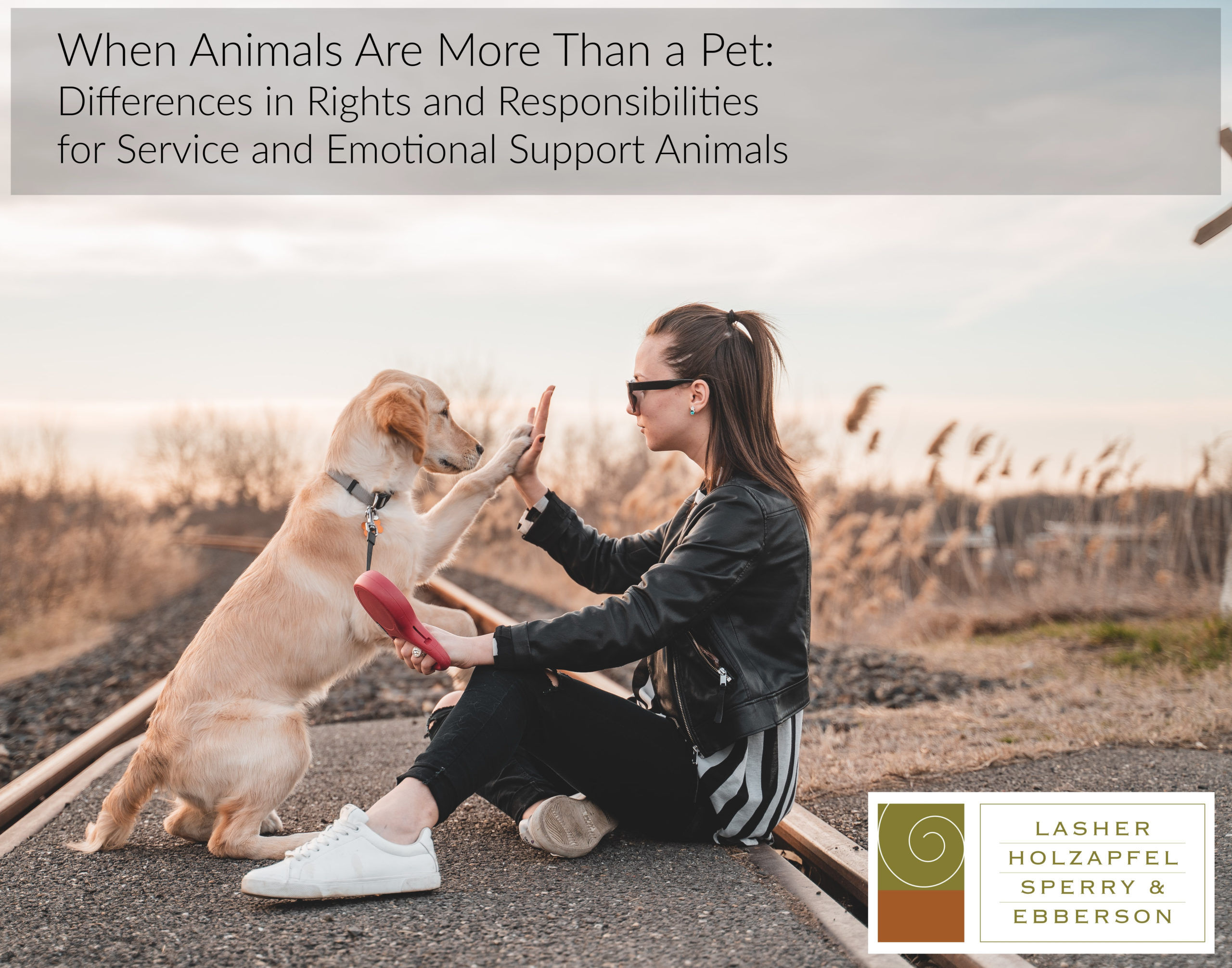When Animals Are More Than a Pet: Differences in Rights and Responsibilities for Service and Emotional Support Animals

Posted on June 15, 2022 by Kelly Rutledge
What is the difference between a service animal and an emotional support animal?
A service animal is a dog which has been trained to perform a specific task or to do work directly related to a person’s disability. Service animals perform a wide variety of vital services such as allergen alerts, seizure response, and hearing or guide assistance. The Americans with Disabilities Act, or ADA, specifically protects these animals and they are granted access to anywhere the public is allowed to go. The ADA regulations also provide for miniature horses as service animals; however, businesses may not always be able to accommodate miniature horses within their facilities. Miniature horses must be housebroken and under their owner’s control. Before allowing a miniature horse entry, business facilities may need to determine whether the space can accommodate the horse’s size and ensure that the horse will not compromise the safe operation of the facility.
An emotional support animal is an animal companion that provides a benefit to an individual with some form of disability without specific training. There are no breed or species requirements for an emotional support animal and neither Washington’s equal rights laws nor the ADA protect emotional support animals.
When do businesses have to accommodate emotional support animals?
On occasion, laws extend the definition of service animal beyond the ADA definition to cover emotional support animals as well. Two examples of such laws are the Air Carrier Access Act, or ACAA, and the Fair Housing Act, or FHA.
The ACAA extends the definition of a service animal to include any animal that is trained or able to provide assistance to a qualified person with a disability, or any animal assisting with disabilities by providing emotional support. There are some limits to what the ACAA requires of aircraft carriers; it allows individual evaluation of unusual animals and allows airlines to request documentation and advanced notice for emotional support and psychiatric service animals. Emotional support animals may be excluded if they are too large, threatening, disruptive, or if they are prohibited from entering a foreign country. The ACAA also specifically allows airlines to exclude snakes, reptiles, ferrets, rodents, and spiders. An example of an excludable animal made the news in 2018; you may remember the emotional support peacock who was denied boarding for a United Airlines flight.[1]
The FHA also extends protection to a broad category of assistance animals, capturing both emotional support and service animals under its protection. Under the FHA, housing providers may not refuse to make reasonable accommodations in rules or services when such accommodations may be necessary to afford a person the equal opportunity to use and enjoy the housing. This means that the housing provider may not deny someone with a disability an accommodation due to a no pets policy or charge a pet deposit for the assistance animal to live within their facility. There is a limit to the accommodations which the housing provider must offer – the accommodation request cannot impose undue financial hardship on the housing provider, fundamentally alter the nature of operations, pose a direct threat to health and safety of others, or cause significant physical damage to the property.
How will a business know if an animal is a service animal?
Determining which animals are service animals is difficult. Only two questions are allowed under the ADA.
One: Is the animal required because of a disability?
Two: What work or task has the animal been trained to perform?
Businesses may not ask the about the individual’s disability, require proof of certification or training, require the animal to wear identification, or ask that the animal demonstrate its ability to perform their task. Much like people, if the animal is disruptive or a threat to the health and safety of others on the premises, it could be asked to leave.
What happens if someone claims their pet is a service animal when it isn’t?
In Washington, it is illegal to claim that a pet is a service animal for the purpose of utilizing any accommodations provided to service animals. The misrepresentation of an animal as a service animal is a misdemeanor.[2]
If you have additional questions, the attorneys in Lasher’s Estate Planning, Trust & Probate, Business Litigation and Corporate Business Law teams are here to assist.
[1] https://www.nbcnews.com/storyline/airplane-mode/emotional-support-peacock-denied-flight-united-airlines-n842971
[2] RCW 70.84.070

